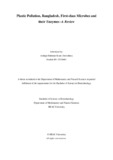Plastic pollution, Bangladesh, first-class microbes and their enzymes -a review
Abstract
The invention of plastics has been generally seen as a benefit to contemporary living because of its light weight, great strength and multi-faceted use while being cheaper than other alternative materials. However, due to their minimal biodegradability, overconsumption, and widespread mismanagement, plastics have now become pervasive in all environmental compartments and are considered accountable for creating massive pollution to air, soil, and water bodies and endangering our planet's sustainability. Different characteristics of plastic polymers have been created to substitute materials such as wood, glass, and metals in a variety of applications. As a result, there has been an exponential rise in the production of plastic waste, which has subsequently been identified as a worldwide environmental concern. Plastic waste has had a negative impact on life on Earth, owing to its unwelcome build up in landfills, seeping into the soil, increasing greenhouse gas emissions, and other factors. Their effect on aquatic environments is much more harmful, since they induce entanglement, ingestion, and intestinal obstruction in aquatic species. Furthermore, plastics, particularly microplastics, have been shown to disrupt chemical interactions between marine species, to induce intrinsic toxicity via leaching, and to absorb persistent organic pollutants and pathogens. Bangladesh is no exception to this worldwide trend, but there has been some effort to evaluate the quantity of plastic waste and its consequences, which is required to properly combat this growing danger. The present techniques for removing these pollutants (incineration, landfilling, and recycling) are very expensive, unsustainable, and add to our environmental load. As a result, current research has focused increasingly on the ability of biological systems to breakdown synthetic polymers. In this respect, it has been shown that certain insects, bacteria, and fungus consume these polymers and transform them into ecologically beneficial carbon compounds. As a result, this review emphasizes the various functions performed by microbes in this process, based on current research. Actinomycetes, algae, bacteria, fungi, and their enzymes are discussed in terms of their involvement in increasing the breakdown of synthetic plastics, with an emphasis on their modes of action and possible enzymatic processes. Furthermore, key areas for further investigation, such as the manipulation of microorganisms through molecular cloning, modification of enzymatic characteristics, and metabolic pathway design, are highlighted, as well as the need for researchers to conduct a comprehensive study of plastic pollution in Bangladesh and for appropriate authorities to develop policies and regulations before it is too late.

